TAAP – Theater Arts Apprenticeship Program
This program is designed for dedicated students who are interested in working hands-on alongside professional theater artists on a full-scale musical production.
Click here to apply for The Sound of Music apprenticeships! We are still accepting students for the following tracks: Music Directing, Stage Management, Choreography, Costume Design, Props Design, Lighting Design, Sound Design/Engineering.
Read below to learn more about the program and the available apprentice tracks.
We welcome students of all levels (7th grade – university) to apply, regardless of previous experience. Whether you are a seasoned student of the theater and are getting ready to launch into a career, or just starting out and interested in seeing whether theater is for you, this is an excellent opportunity for all!
TAAP is a tuition-based program. Tuition assistance is available and may be applied for after being accepted into the program. Click to review YMTC’s complete set of COVID protocols.
Learn more about each position below! (Not all positions available for all productions)
Directing
 The Director brings together the many complex pieces of a production—the script, actors, set, costuming, lighting and sound and music—into a unified whole.
The Director brings together the many complex pieces of a production—the script, actors, set, costuming, lighting and sound and music—into a unified whole.
As an apprentice, you will learn the skills and responsibilities of the Director by assisting them as they:
- Interpret the script
- Plan rehearsals with the Stage Manager
- Guide actors in discovering their characters and on-stage relationships, giving instruction or negotiating ideas when needed
- Create staging while working within the confines of a musical score to bring a scene to life
- Collaborate with designers
The apprentice must be available for all rehearsals, tech week, and performances; however, conflicts may be accommodated on a case-by-case basis, at the discretion of their mentor and the Production Manager.
Music Directing
The Musical Director oversees all musical aspects of a production. From auditioning the cast, interpreting the score with the creative team in rehearsals, to leading the orchestra and cast in performances, their job is to make musical decisions with all other members of the production.
As an apprentice, you will learn the skills and responsibilities of the Musical Director by assisting them as they:
- Interpret the score from pre-production and auditions through the final performance
- Plan and accompany music rehearsals with the Stage Manager and Director
- Teach and shape the vocal parts for each actor, giving instruction and negotiating issues when necessary
- Work with the director and choreographer to help bring the score to life within the needs of the creative team’s vision
- Collaborate with designers
- Organize, run, and address the needs of the orchestra at rehearsals, sitzprobe, dress rehearsals, and performances
The apprentice must be available for all music rehearsals, as many staging rehearsals as possible, tech week, and performances; however, conflicts may be accommodated on a case-by-case basis, at the discretion of their mentor and the Production Manager.
It is possible, though not necessary, for the Apprentice to also apply to be a student member of the orchestra if the orchestration requires it.
Stage Management
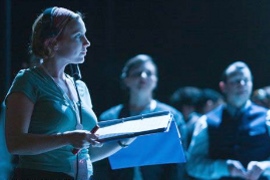
The Stage Manager is an intermediary between the actors and the director, and as such is timely, efficient, detail-oriented, and present at every rehearsal and performance.
As an apprentice, you will learn the skills and responsibilities of the Stage Manager by assisting them as they:
- Schedule and run rehearsals (task master) according to cast conflicts and director’s needs
- Maintain a clean, safe, and inclusive rehearsal environment for all actors
- Ensure the actors have adequate rehearsal props, attire, and break time
- Communicate the director’s needs to designers, builders, and actors
- Keep record of blocking, light cues, sound cues, props, set changes, and costume changes in a master copy of the script (called the “prompt book”)
- Use the prompt book to call cues during the run of the show
The apprentice must be available for all rehearsals, tech week, performances, and strike; however, conflicts may be accommodated on a case-by-case basis, at the discretion of their mentor and the Production Manager.
Choreography
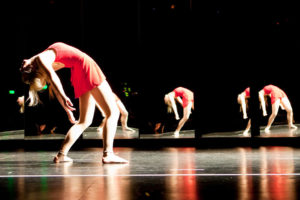 The Choreographer creates dance for the musical numbers, as well as stylized movement for actors as requested by the Director; considering the mood and themes of the production as a whole.
The Choreographer creates dance for the musical numbers, as well as stylized movement for actors as requested by the Director; considering the mood and themes of the production as a whole.
As an apprentice, you will learn the skills and responsibilities of the Choreographer by assisting them as they:
- Interpret the story, music, and themes of the production, through movement
- Create choreography for musical numbers and stylized movement for scenes, which further the story and follow the Director’s vision
- Teach and provide useful movement language for actors
- Collaborate with musical director, scenic designer and costume designer
- Plan and run dance rehearsals
- Lead dance calls before each performance, or delegate a dance captain to do so, according to the schedule determined by the Stage Manager
The apprentice must work with their mentor to schedule dates for mentoring, and must be available for all dance rehearsals, tech week, and performances; however, conflicts may be accommodated on a case-by-case basis, at the discretion of their mentor and the Production Manager.
Scenic Design
- Analyze the script in order to understand the story, the characters, the arc of their journeys, the locations and the important underlying themes of the show.
- Collaborate with the director to create a vision for the production
- Understand production limitations including the budget, the schedule, the abilities of the people working on the show and the specifics of the venue/theater
- Generate diagrams, sketches and scale models to communicate the scenic design ideas for the production.
- Collaborate with the director, lighting designer, costume designer, props designer and set builder to develop the physical and metaphorical world
We will be using the book “Unmasking Theater Design” by Lynne Porter as a guide.
Props Design/Scenic Painting
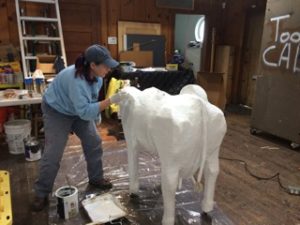 The Set & Props Designers and Builders (sometimes the same people) collaborate with the Director to create the physical environment of the show, to be inhabited, used and manipulated by the characters as they tell the story.
The Set & Props Designers and Builders (sometimes the same people) collaborate with the Director to create the physical environment of the show, to be inhabited, used and manipulated by the characters as they tell the story.
As an apprentice, you will learn the skills and responsibilities of the Props Designer & Scenic Painter by assisting them as they:
- Pull potential set pieces or props from company stock, or source from other theaters
- Build set pieces or props as needed when unable to source them from stock
- Work on all aesthetic aspects of the set, including painting/decorating the set and props
- Creatively work within the confines of a fixed budget and keep the Director updated on progress of and/or changes to design
Additionally, during the run of the show, the apprentice will act as run crew (with the guidance of their Mentor and the Stage Manager) to:
- Assist with scene changes by moving set pieces and/or striking & pre-setting props
- Ensure props are properly stored, maintained, and cleaned when necessary
- Communicate any set or prop malfunctions to the Stage Manager
The apprentice must work with their mentor to schedule dates for mentoring, and must be available for all of tech week, performances, and strike; however, conflicts may be accommodated on a case-by-case basis, at the discretion of their mentor and the Production Manager.
Costume Design/Wardrobe Management
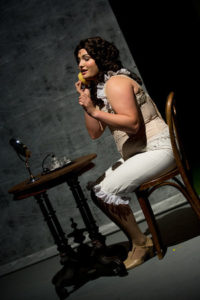 The Costume Designer collaborates with the Director to design a cohesive wardrobe of clothing and accessories, to be worn by the actors in performance.
The Costume Designer collaborates with the Director to design a cohesive wardrobe of clothing and accessories, to be worn by the actors in performance.
As an apprentice, you will learn the skills and responsibilities of the Costume Designer by assisting them as they:
- Interpret the mood/themes of the production, as well as the personalities and backgrounds of each character; considering occupation, social status, gender, age, sense of style and tendencies towards conformity or individualism
- Chart and draft all costume needs as determined by the script and the Director
- Pull potential costumes from company stock, or source from other theaters
- Build costumes as needed when unable to source them from stock
- Take measurements of the actors, and fit costumes to them
- Work within the confines of a fixed budget and keep the Director updated on progress of and/or changes to design
Additionally, during the run of the show, the apprentice will act as wardrobe manager (with the guidance of the Costume Designer) to:
- Assist actors with dressing pre-show, and quick changes during performances.
- Ensure costumes are properly hung, maintained, and cleaned
- Communicate any costume malfunctions/changes to the Stage Manager
The apprentice must work with their mentor to schedule dates for mentoring, and must be available for all fittings, tech week, performances, and strike; however, conflicts may be accommodated on a case-by-case basis, at the discretion of their mentor and the Production Manager.
Hair & Makeup Design
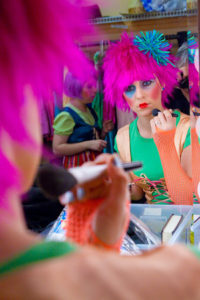 The Hair & Makeup Designer collaborates with the Director to create hairstyles and makeup effects for each character, using wigs and prosthetics when necessary.
The Hair & Makeup Designer collaborates with the Director to create hairstyles and makeup effects for each character, using wigs and prosthetics when necessary.
As an apprentice, you will learn the skills and responsibilities of the Hair & Makeup Designer by assisting them as they:
- Interpret the mood and themes of the production, as well as the personalities and backgrounds of each character; considering occupation, social status, gender, age, sense of style and tendencies towards conformity or individualism
- Research, plan, and execute various makeup, hair, and wig applications
- Assist actors in styling their hair and applying their makeup before and during each performance; and when appropriate, instructing them on how to do it on their own
- Work within the confines of a fixed budget and keep the Director updated on progress of and/or changes to design
The apprentice must work with their mentor to schedule dates for mentoring, and must be available for all of tech week, performances, and strike; however, conflicts may be accommodated on a case-by-case basis, at the discretion of their mentor and the Production Manager.
Lighting Design/Engineering
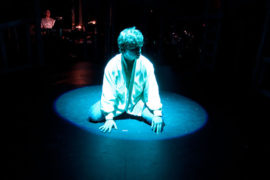 The Lighting Designer collaborates with the Director to illuminate the set and actors in ways that are both practical and artful; by manipulating the intensity, shape, direction and color of light on stage.
The Lighting Designer collaborates with the Director to illuminate the set and actors in ways that are both practical and artful; by manipulating the intensity, shape, direction and color of light on stage.
As an apprentice, you will learn the skills and responsibilities of the Lighting Designer by assisting them as they:
- Interpret the mood, themes, and settings of the production; considering time, location, mood and desired visibility of each scene
- Research, plan, and execute a comprehensive lighting “plot” (i.e. placement of lighting instruments in the theater)
- Hang, power, and focus lighting instruments in the theater, according to the plot
- Collaborate with Stage Manager and Director to determine timing and duration of “cues” (i.e. changes in lighting during the show, controlled by the light board)
- Program cues into the light board
The apprentice must work with their mentor to schedule dates for mentoring, and must be available for all of tech week, performances, and strike; however, conflicts may be accommodated on a case-by-case basis, at the discretion of their mentor and the Production Manager.
Sound Design/Engineering
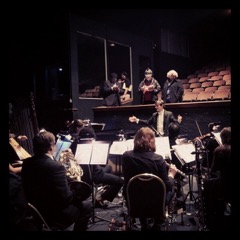 The Sound Designer collaborates with the Director to create the soundscape of the story, through use of live and/or recorded sound effects.
The Sound Designer collaborates with the Director to create the soundscape of the story, through use of live and/or recorded sound effects.
As an apprentice, you will learn the skills and responsibilities of the Sound Designer by assisting them as they:
- Interpret the mood, themes, and settings of the production; considering time, location, action and tone of each scene
- Research, plan, and execute a comprehensive soundscape, creating cues from scratch as needed
- Collaborate with Stage Manager and Director to determine timing, duration, and audibility of “cues” (i.e. the sound effects within the context of the show)
Additionally, you will learn the skills and responsibilities of the Sound Engineer by assisting them as they:
- Acquire, position, and power sound equipment in the theater
- Fit wireless microphones to actors
- Manage sound levels on the board during performances
The apprentice must work with their mentor to schedule dates for mentoring, and must be available for sitzprobe, tech week, performances, and strike; however, conflicts may be accommodated on a case-by-case basis, at the discretion of their mentor and the Production Manager.
Technical Theater & Run Crew
This is a unique apprenticeship for the adventurous and tireless thespian, which includes experience in the Lights, Sound, and Scenic departments, Mentored by the Technical Director.
As an apprentice, you will learn the essential skills and responsibilities of these three crafts by assisting in various stages of the tech process in the theater:
- Installing and adding finishing touches to the set
- Installing, coloring, and programming the lighting design
- Installing and engineering the sound design
Additionally, throughout the run of the show, the apprentice will have the opportunity to participate in one of the following roles:
- Set and Props Master
- Light Board Captain
- Microphone Ninja
The apprentice must coordinate with their mentor to schedule specific dates for mentoring, starting at least 2 weeks prior to opening night, including: designer run and sitzprobe rehearsals, paper tech, load-in, dress rehearsals, performances, and strike; however, conflicts may be accommodated on a case-by-case basis, at the discretion of their mentor and the Production Manager.
Apprenticeships are offered for each show of the season on a rolling basis.
If you have any questions about the Theater Arts Apprenticeship Program or about YMTCʼs policies, please email info@ymtcbayarea.org or call 510-595-5514.
